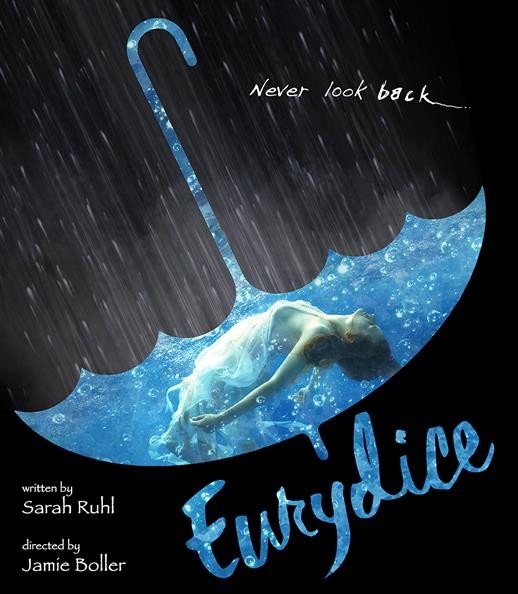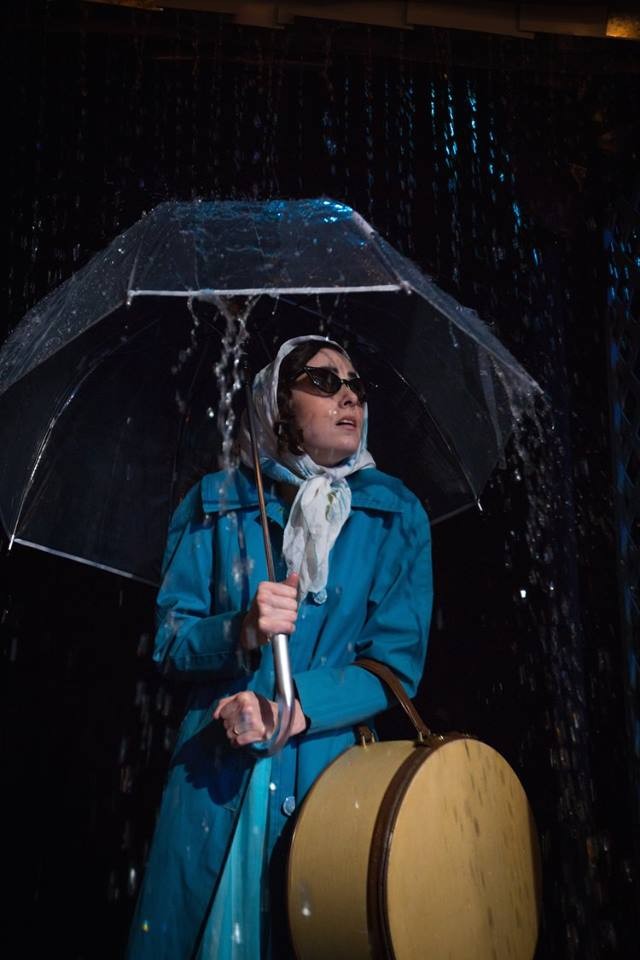
Sarah Ruhl’s Eurydice isn’t for theater lovers who like a lot of action or tense tightly plotted drama. Though it borrows from ancient Greek forms it’s barely recognizable as a play in the traditional sense. It’s more of a living painting or character-driven poem that borrows heavily from its source material without ever pledging fidelity.
Written after the playwright’s own father’s death, Eurydice is a grief project, strange and gentle. You can feel the author wrestling with pain — twisting it into origami birds and hurtling it at the sky. The New Moon Theatre Company and Director Jamie Boller have done an admirable job of bringing Ruhl’s quirky almost literally colorless meditation on memory and language to life, helping to cement the company’s reputation for taking on projects they probably don’t have the resources to produce, and making memorable theater anyway.
New Moon has turned to the Orpheus myth before having staged Tennessee Williams’ intense Orpheus Descending. Unlike Williams’ Southern drama (and also unlike the original source material) this contemporary update takes the spotlight off Orpheus, a supernaturally popular musician who’s songs are so beautiful they enchant inanimate objects. It reorients the story around his love Eurydice who dies on her wedding day and is taken to the underworld inspiring Orpheus to undertake a hero’s journey to rescue her. As is the case in every version of the story he fails to rescue his love. Everybody dies — this is hardly a spoiler.

Ruhl introduces a new character to the drama— the Father. Unlike other shades dipped in the waters of forgetfulness, he remembers the language of living people. He remembers his life and family. He’s spent his whole death writing letters to his daughter, and when she arrives he teaches her to remember— a kindness with all the force of cruelty. The two rebel ghosts are regularly chastised by animated stones that are anything but silent. These rocks—witness to all— are our chorus.
Though minimal in one sense Eurydice is a gift to designers. It rains real drops inside an elevator to hell. Rooms are created out of nothing. Objects fly. It’s the kind of text best suited for companies with substantial budgets or none at all, facilitating a commitment to total theater. New Moon falls somewhere in between resulting in a production that’s imaginative and inspirational.
Eurydice’s secret weapon is an ensemble cast peopled with strong actors who listen to one another and play their parts like musicians in an improvisational jam. Still, it’s Eurydice’s play, and with effortless effervescence (even in death) Michelle Miklosey leads the way. As Orpheus Gabe Buetel-Gunn might be more overtly musical, but all holes are patched first by his doting, then by his pain of loss.
In some ways the tables are turned on Orpheus in this story. In the original myth Eurydice is barely there while in this version it’s the musician who’s been pushed to the margins. But Buetel-Gunn is always present, even when mute. In an understated, slow burning performance as Eurydice’s sweetly subversive father Jeff Kirwan reminds us that not all masculinity is toxic and not every patriarch is of the Patriarchy. In fact, as Eurydice demonstrates, some dads are so special they inspire poetry.
Similarly, this gray, drippy, lovely production (with terrific lights by Mandy Heath, costumes by Austin Blake Conlee, and original music by Joe Johnson) seems destined to inspire local artists who look back in order to look ahead; who aren’t constrained by convention; who like to color outside the lines.